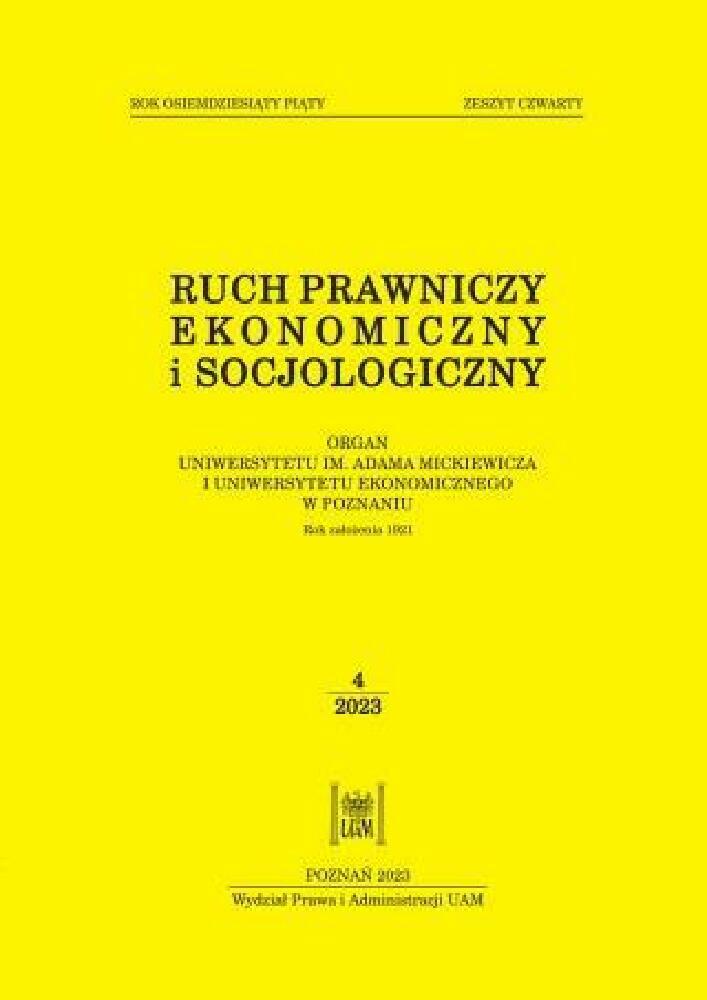Abstrakt
The research presented in the article aims to assess the scope of the normative freedom of EU Member States when implementing non-conviction based confiscation. This study was based on the case law of the Court of Justice of the European Union (CJEU) and the European Court of Human Rights (ECHR). The study shows that despite the broad discretion of the Member States resulting from the position of the CJEU, domestic regulation of this type of confiscation falls outside the scope of EU law; the extensive jurisprudence of the ECHR sets quite precise boundaries concerning the concept of confiscation without prior conviction. Thus, it limits the discretion of Member States in this regard, providing both safeguards for individuals and guidelines for national legislators that intend to develop non-conviction based confiscation regimes in their domestic legal system.
Finansowanie
National Science Centre, Poland, grant no 2022/45/B/HS5/03080
Bibliografia
Alagna, F. (2015). Non-conviction based confiscation: why the EU Directive is a missed opportunity. European Journal on Criminal Policy and Research 21: 447-461. DOI: https://doi.org/10.1007/s10610-014-9252-8
Bikelis, S. (2020). Modeling the patterns of civil confiscation: balancing effectiveness, proportionality and the right to be presumed innocent. Baltic Journal of Law & Politics 2(13): 24-48. DOI: https://doi.org/10.2478/bjlp-2020-0010
Boucht, J. (2017a). The Limits of Asset Confiscation: On the Legitimacy of Extended Appropriation of Criminal Proceeds. Oxford, Portland: Bloomsbury.
Boucht, J. (2017b). Extended confiscation: criminal assets or criminal owners? In K. Ligeti, M. Simonato (eds.), Chasing Criminal Money: Challenges and Perspectives on Asset Recovery in the EU (pp. 117-137). Oxford: Hart Publishing.
Fernandez-Bertier, M. (2016). The confiscation and recovery of criminal property: a European Union state of the art. ERA Forum 17: 323-342. DOI: https://doi.org/10.1007/s12027-016-0436-1
France, G. (2022). Non-conviction-based confiscation as an alternative tool to asset recovery, prepared for the Transparency International. https://knowledgehub.transparency.org/assets/uploads/helpdesk/Non-Conviction-Based-Forfeiture_2022.pdf
Gragl, P. (2017). An olive branch from Strasbourg? Interpreting the European Court of Human Rights’ resurrection of Bosphorus and reaction to Opinion 2/13 in the Avotiņš Case: ECtHR 23 May 2016, Case No. 17502/07, Avotiņš v Latvia. European Constitutional Law Review 13(3): 551-567. DOI: https://doi.org/10.1017/S1574019617000165
Hendry, J., King, C. (2015). How far is too far? Theorising non-conviction-based asset forfeiture. International Journal of Law in Context 11(4): 398-411. DOI: https://doi.org/10.1017/S1744552315000269
Kennedy, A. (2006). Designing a civil forfeiture system: an issues list for policymakers and legislators. Journal of Financial Crime 13(2): 132-163. DOI: https://doi.org/10.1108/13590790610660863
King, C. (2022). EU developments in non-conviction-based confiscation. In L. Heffernan (ed.), Criminal Law and Justice in the European Union (pp. 105–120). Dublin: Clarus Press. DOI: https://doi.org/10.2139/ssrn.4361086
Kokott, J., Sobotta, C. (2015). Protection of fundamental rights in the European Union: on the relationship between EU fundamental rights, the European Convention and national standards of protection. Yearbook of European Law 34(1): 60-73. DOI: https://doi.org/10.1093/yel/yev003
Kolarov, T. (2020). Historic analogs of civil confiscation of unexplained wealth – the case of Bulgaria. Journal of Financial Crime 27: 562-565. DOI: https://doi.org/10.1108/JFC-08-2019-0108
Kolarov, T. (2021). Challenges in settling nonconviction based civil confiscation of unexplained wealth. Journal of Money Laundering Control 24(3): 483-490. DOI: https://doi.org/10.1108/JMLC-07-2020-0076
Krajewski, M. (2018). Associação Sindical dos Juízes Portugueses: the Court of Justice and Athena’s dilemma. European Papers 3(1): 395-407.
Lenaerts, K., Gutiérrez-Fons, J.A. (2010). The constitutional allocation of powers and general principles of EU law. Common Market Law Review 47(6): 1629-1669. DOI: https://doi.org/10.54648/COLA2010069
Levi, M., Reuter, P. (2006). Money laundering. Crime and Justice: A Review of Research 34: 289-376. DOI: https://doi.org/10.1086/501508
Maugeri, A.M. (2018). Mutual recognition and confiscation of assets: an EU perspective. In C. King, C. Walker, J. Gurulé (eds.), The Palgrave Handbook of Criminal and Terrorism Financing Law (pp. 392-455). London: Palgrave Macmillan Cham. DOI: https://doi.org/10.1007/978-3-319-64498-1_17
Meyer, F. (2020). Recognizing the unknown – the new confiscation regulation. European Criminal Law Review 10(2): 140-170. DOI: https://doi.org/10.5771/2193-5505-2020-2-140
Milone, S. (2017). On the borders of criminal law: a tentative assessment of Italian “non-conviction based extended confiscation. New Journal of European Criminal Law 8(2): 150-170. DOI: https://doi.org/10.1177/2032284417711573
Öberg, J. (2019). Limits to EU Powers: A Case Study of EU Regulatory Criminal Law. Oxford, Portland: Hart Publishing.
Ochnio, A.H. (2017). The intricate jurisprudence of the European Court of Human Rights on non-conviction based confiscation. Ius Novum 1: 36-47.
Panzavolta, M. (2017). Confiscation and the concept of punishment: can there be a confiscation without a conviction? In K. Ligeti, M. Simonato (eds.), Chasing Criminal Money: Challenges and Perspectives on Asset Recovery in the EU (pp. 25–52). Oxford: Hart Publishing.
Panzavolta, M., Flor, R. (2015). A necessary evil? The Italian “non-criminal system” of asset forfeiture. In J.P. Rui, U. Sieber (eds.), Non-Conviction-Based Confiscation in Europe (pp. 111-150). Berlin: Duncker & Humblot.
Rakitovan, D. (2016). Extended confiscation – sui generis measure. Journal of Eastern-European Criminal Law 2: 78-97.
Rui, J.P. (2015). Introduction. In J.P. Rui, U. Sieber (eds.), Non-Conviction-Based Confiscation in Europe (pp. 1-10). Berlin: Duncker & Humblot.
Rui, J.P., Sieber, U. (2015). NCBC in Europe – bringing the picture together. In J.P. Rui, U. Sieber (eds.), Non-Conviction-Based Confiscation in Europe (pp. 245–304). Berlin: Duncker & Humblot.
Simonato, M. (2015). Directive 2014/42/EU and non-conviction based confiscation: a step forward on asset recovery? New Journal of European Criminal Law 6(2): 213-228. DOI: https://doi.org/10.1177/203228441500600205
Simonato, M. (2017). Confiscation and fundamental rights across criminal and non-criminal domains. ERA Forum 18: 365-379. DOI: https://doi.org/10.1007/s12027-017-0485-0
Vogel, J. (2015). The legal construction that property can do harm. In J.P. Rui, U. Sieber (eds.), Non-Conviction-Based Confiscation in Europe (pp. 226-242). Berlin: Duncker & Humblot.
Wycichowski-Kuchta, G. (2022). In rem confiscation in EU law after the Agro in 2001 judgement: the Polish perspective. In H. Kuczyńska, A.H. Ochnio (eds.), Current Issues of EU Criminal Law (pp. 159-175). Warsaw: ILS PAS Publishing House.
Licencja
Prawa autorskie (c) 2023 WPiA UAM

Utwór dostępny jest na licencji Creative Commons Uznanie autorstwa 4.0 Międzynarodowe.





